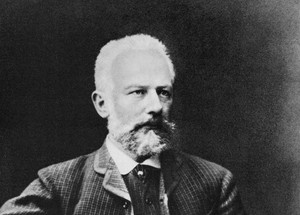| Pyotr TchaikovskyComposerPeter Ilyich Tchaikovsky was born on May 7, 1840 at Votkinsk, in the government of Vyatka, Russia. He was close to his family - his father (a mine inspector), his mother, four brothers, and a sister. At the age of five, he began to study piano, soon revealing his amazing gifts. It wasn‘t until he was 21, however, that he began to study music seriously.
In 1863, Tchaikovsky entered the St. Petersburg Conservatory and undertook some private training. The young Tchaikovsky was a master at improvisation, but so unschooled he was unaware of such simple musical tenets as the possibility of modulating to different keys.
Tchaikovsky frequently attended the opera and fell in love with the music of Mozart. His diligence became apparent when his composition teacher, Anton Rubinstein, assigned variations as homework. Tchaikovsky sat up all night and prepared 200.
In 1866, Tchaikovsky moved permanently to Moscow where he accepted a teaching position in a new conservatory established by Anton Rubinstein‘s brother, Nicholas. It was there that his First Symphony was created, receiving a warm reception by Moscow audiences in 1868. It was also there that Tchaikovsky had his first nervous breakdown, due to the stress of composing the First Symphony . Interestingly, Tchaikovsky had asked his former teacher, Anton Rubinstein, to premiere the work in St. Petersburg, a request which was ultimately denied.
Other works followed with less success, including Tchaikovsky‘s first opera, The Voyevoda, in 1869, later re-worked into The Oprichnik in 1874. By then Tchaikovsky‘s Second Symphony had begun winning acclaim, as had his First Piano Concerto . Following these compositions were his Third Symphony and Swan Lake , the tone poem Francesca da Rimini in 1875, and the Rococo Variations for cello and orchestra in 1876. By the end of 1876, Tchaikovsky was contacted by a wealthy admirer, Nadejda Fillaretovna von Meck, who gave him several commissions and became his sponsor for the next 12 years.
Throughout this period, Tchaikovsky continued to struggle with his homosexuality. Although Tchaikovsky had a brief affair with opera singer Desiree Artot, he was clearly inclined to deny his own nature. In a letter to his brother, Tchaikovsky wrote, "I am aware that my inclinations are the greatest and most unconquerable obstacle to happiness; I must fight my nature with all of my strength. I shall do everything possible to marry this year."
Indeed, he did marry a young woman, Antonina Ivanovana Milyukoff, on July 6, 1877. However, within a month, he discovered they were incompatible and spent the next few months running away from his new wife. He also made a failed attempt at suicide by walking into the Moska River in the hopes of contracting pneumonia. It was at this point, in the late 1870s, that he wrote some of his greatest works, the opera Eugene Onegin , the Violin Concerto , and the Fourth Symphony.
Based on Alexander Pushkin‘s novel in verse, Eugene Onegin (1878) tells the story of a girl fascinated by a man who ultimately rejects her and his later remorse. That same year, Tchaikovsky also wrote the Violin Concerto . He wrote Manfred in 1885; the Fifth Symphony in 1888; another successful opera, Pique Dame (The Queen of Spades) in 1890; and the Casse-Noisette ballet in 1891. These successes made Tchaikovsky famous throughout the world. He temporarily surrendered his shyness to conduct and, in 1888, made an international conducting tour. In 1891, Tchaikovsky came to New York and conducted his own works at the ceremonies of the opening of Carnegie Hall.
By 1890, the inevitable break with Madame von Meck had occurred and, while Peter gained his financial independence, he felt his loss on a more personal than professional level. Madame von Meck, in addition to an income of 6,000 roubles, had provided Tchaikovsky an outlet to air his opinions, beliefs, hopes, and dreams. There has been no particular reason recorded as to why the break between them occurred.
In 1893, Tchaikovsky completed the Pathetique Symphony (No. 6) and conducted it at St. Petersburg to a rather apathetic response. Unfortunately, Peter would not live to see its ultimate success. By most accounts, Tchaikovsky drank an unfiltered (unboiled) glass of water, contracted cholera, and died on November 6, 1893. In recent years, some have proffered another theory: that Tchaikovsky was forced to take arsenic to preserve his school‘s honor when his homosexuality was to become public.
However Tchaikovsky died, 8,000 mourners attended his funeral. He was buried at St. Petersburg‘s Alexander Nevsky Monastery. | |


